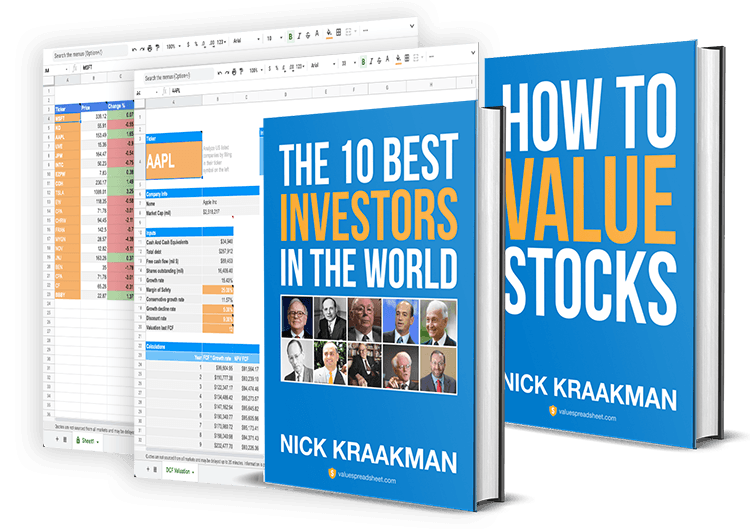Transcript
Hello, everyone, welcome to the 10th episode of the Value Investing Bootcamp podcast.
My name is Nick Kraakman, I'm your host and I'm very excited to be here with you again, and very excited that you're tuning in!
I hope you're enjoying the show so far.
Yeah, this podcast again, it will be a limited edition podcast, probably around 20 episodes, so this means that we're halfway through the process right now, with this 10th episode.
So, yeah, I hope to share some more interesting content with you.
If you have any suggestions for things that you want me to cover, you can always send a tweet to @ValueSheet, or an email to
So, today, what we'll cover is a very important, yet for some people very boring aspect of investing.
We'll talk about financial statements.
Financial statements are the reports that companies listed on the stock exchange are required to hand in to the-- at least in the US, through the Securities and Exchange Commission.
They just keep an eye on all the companies, and so this means that this one repository, you can check it out on SEC.gov, there, you can find out all the so called filings, and they include quarterly statements and annual financial statements.
Most companies are required to hand in their financial statements every quarter, and in those financial statements you can find what a company owns, what a company owes, and how much money it's generating, how much profit or how much losses.
So, you can find all the financial information regarding a company in those financial statements.
This is really the go to source for value investors, and analyzing these financial statements and basing your investment decisions on the information you find there is called fundamental analysis.
We talked in an earlier episode about technical analysis, which uses price changes to actually assess whether a company is a good buy or not, and we also discussed that this technical analysis is actually not a good way to analyze stocks, because prices don't say much about the actual performance of a company.
But financial statements do, because they show the actual performance of a company.
That is not to say that the information in financial statements is 100% perfect, because there are these accounting rules and principles that just yeah, allow for some tinkering, and some things are a little bit subjective.
It's all the best guess of an accountant, so to say.
However, this is the best possible information we can get, so we’ll have to work with this.
So, the things that a company has to report are its income statements, which lists all the income, the money is earned and all the costs that made.
And you have the balance sheet, which shows all the assets and liabilities the company has, so how much possessions and how much debt and things like that, how many buildings and you can all find it on the balance sheet.
It's a very important statement, financial statement.
And another one is the cash flow statement, which shows the actual cash transactions that are happening, and this is a very, very interesting, and very important financial statement, because you can't really tinker that much with those cash transactions as you can with reported earnings.
Earnings can be manipulated in several ways to make them appear higher than they actually were, that is because of the earlier stated accounting rules and principles.
So, when we have these financial statements, what are what are we looking for?
I mean, what are value investors looking for?
Well, we talked about the fact that value investors look for good companies selling at discount prices.
Good companies are companies that are consistently profitable, that have a sustainable competitive advantage, so something which is not easy to copy by competitors.
They have low debt levels, preferably, so they have enough cash to pay their obligations that keeps their company running and also growing.
Those are just a few things you can look for, and there are several ways to do this, so you can also combine some of these numbers.
For example, if you take the net profit that the company has earned, and you compare it to the amount of equity it has, so the amount of value or assets it has, you can calculate the ratio which is called the return on equity.
So, if you divide net income by shareholders equity, with net income, you can find it on the income statement and shareholders equity, you find it on the balance sheet.
If you divide net income by the shareholders equity, you get the return on equity ratio.
So, what does this tell you?
It actually tells you how efficient the company is with its assets, so how much money it earns on its equity investments.
So if, for example, the net profit is, let's say $100,000 and the equity is $1 million, that means the return on equity is 10%.
This means that every $1 the company invest, that company earns and invests back into the company, it will earn 10 cents per invested dollar, so that is all right, it's pretty decent.
But what you are looking for is probably a company with a return on equity ratio of 15% or higher, and if they are able to maintain that level of profitability for a long time, that's probably an indication that they have some sort of a sustainable competitive advantage, something which competitors can't really copy that easily, because otherwise, competitors would have already entered the market and eaten away at their profit margins, which would mean that their return on equity would decline.
So, if you find a company with a stable, consistently high return on equity, so for example, 15% or higher, then yeah, it's maybe an interesting company to to look at further.
Another ratio which is interesting to look at is the debt to equity ratio.
You can take the amount of debt the company has on its balance sheet, and then divide this by their shareholders equity, and you get the return or sorry, you get the debt to equity ratio, which allows you to see how much debt the company has in relationship to how much equity it has.
I prefer companies with a debt to equity ratio of 0.5 or lower, because that means that they managed to fund their own growth instead of relying on external capital too much.
Because if you have debt, you have interest that you have to pay, and this just costs you a lot of money.
But I really strongly suggest, because these few minutes is not nearly enough to cover all there is to know about financial statements, and it is really an important part of the investment process to analyze those financial statements, so I suggest you pick up a book about it.
The one I read and which I really recommend is a book called very originally, Financial Statements by Robert Ittelson.
You can look it up on Amazon or something and read through it, very interesting stuff.
You'll be a financial statements master at the end of that book, so pick that one up, read through it.
And next episode we'll talk about shareholder friendly management, because if an idiot is running a company, no matter how good this product is, the company will not last.
So, we'll talk about this more in the next episode, so I'll see you then.
If you enjoyed today's show, head over to ValueInvestingBootcamp.com to find out more on how you can invest like the pros, manage your own portfolio with confidence, and consistently earn mind boggling returns on the stock market.



